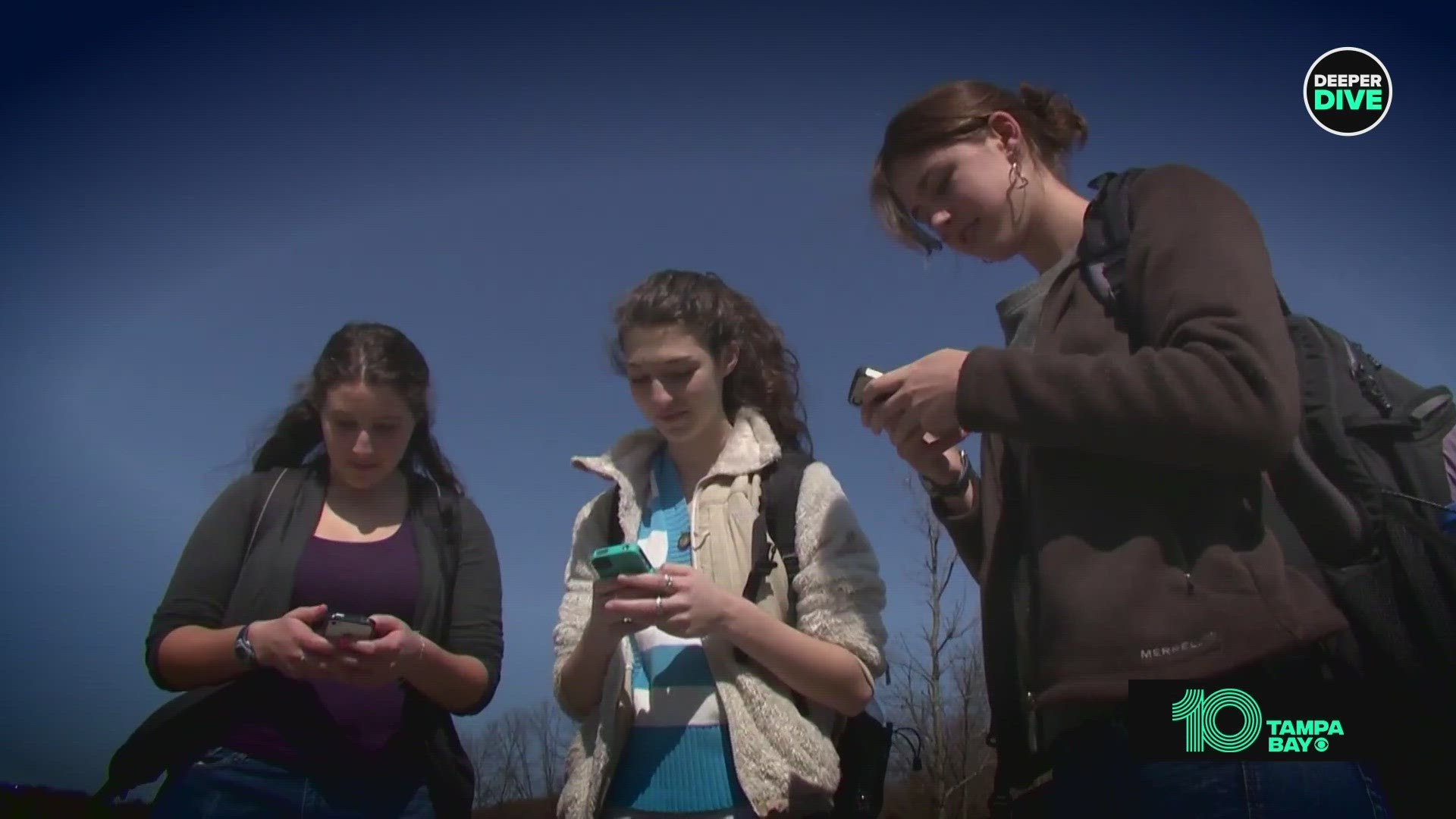TAMPA, Fla. — Florida has joined other states in the fight against social media.
This week, the governor signed a bill to keep some kids and teens off platforms with "addictive" features. Lawsuits from other states have been filed against some companies alleging they're harming the mental well-being of minors. Some officials have also voiced safety and security concerns against them.
However, some teens have said it's been a haven for self-expression and connection. Companies have also criticized such legislation and filed lawsuits stating it violates the First Amendment.
Mental health experts said in this day and age, it's how kids use the platforms that make a difference.
"You have to accept that it's here and then figure out ways to self-manage," said Carrie Zeisse, Tampa Bay Thrives president and CEO.
One study found that for teens between the ages of 12 and 15 years old, using social media for three hours every day led to double the risk of experiencing poor mental health outcomes like anxiety and depression, according to the U.S. Department of Health and Human Services.
"It's very addicting," said Dr. Stacey Sheckner, a licensed psychologist in Tampa. "Whoever made these phones, the second you go on it and you get off of it, you want to go again. It hits the pleasure center in our brain."
She said she sees much younger generations struggling to learn how to interact with people in real-time because of a lack of face-to-face connection.
Her clients often feel isolated and base their worth on the number of likes or reactions to a post, she said. In addition, ongoing comparison to people's lives on social media is contributing to anxiety and depression.
"A lot of patients who come to me are very, very anxious, because they didn't post enough, or they didn't do enough on the weekend, and they have nothing to compare to others," she said.
Sheckner said more research is needed to understand the impact social media may be having on one's brain development.
However, with social media and technology now ingrained in everyday life, experts said there are ways to balance both the good and bad that may come from it.
Setting time limits, curating one's feed, or temporarily logging off may help, too.
At least they did for Carrie Zeisse's child Gray.
"It made me compare myself. It also made me check my phone a lot," Gray Zeisse said.
A former varsity basketball player who took accelerated classes, the struggles the now first-year college student faced may not have been noticeable at first. Gray Zeisse, who identifies as nonbinary, said they eventually took a break for a few months from certain platforms.
Gray Zeisse recalled feeling isolated because of how others appeared to be living their lives through pictures and videos.
Years later, they still take breaks when navigating the digital world gets too overwhelming.
"I keep my phone on 'Do Not Disturb' frequently," Gray Zeisse said. "I just periodically delete them when I find it necessary, and then I hop back on. That's been the best way that I found balance."
The same study found in a small, randomized controlled trial in some college students, limiting social media to 30 minutes every day for three weeks led to significant improvements in depression severity.
Nonetheless, critics have also voiced appreciation for social media's ability to connect people.
For Gray Zeisse, on the one hand, it allowed them to have support from other members of the LGBTQIA+ community. However, comments and judgment from others online also made it difficult to navigate the platforms.
While one technique may work for one person, it may not for the other.
Overall, both Carrie Zeisse and Sheckner said open communication between the parents and guardians to their children are vital.
"Make them consciously aware of how they feel after they're on for long periods of time," Scheckner said. "I think we have to have discussions with these kids."
Lawmakers from both sides have since criticized the presence of social media. In Florida, lawmakers who oppose the recent bill believe it's well-intentioned but it's not up to the state to parent children.
Gov. Ron DeSantis signed a watered-down version of the social media bill. It aims to keep those under 14 years old off social media with the "addictive" features while those 14 and 15 years old will need parental permission.
The bill is set to become law by January of next year, however, it is expected to face legal hurdles. Other states with their own rules have either been blocked or tied up in court.
Companies like TikTok stated it has safeguard features and will continue to keep its platform safe by tackling industry-wide challenges.
NetChoice, a tech-industry group representing a coalition of social media platforms including Meta, which owns Instagram and Facebook, as well as Snapchat and TikTok, previously criticized Florida's bill dubbed HB 3 and stated it violates people's freedom. It has also challenged other states with their own legislation like Arkansas and Ohio.

